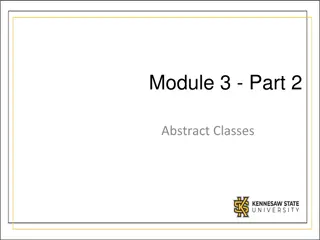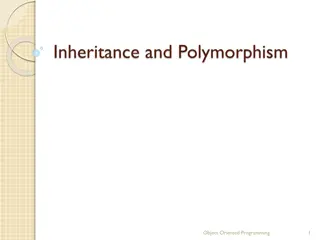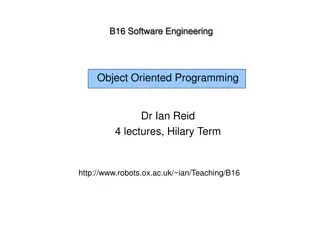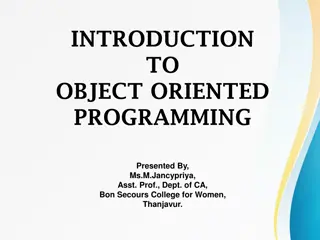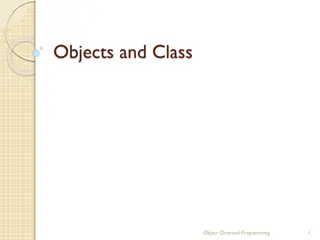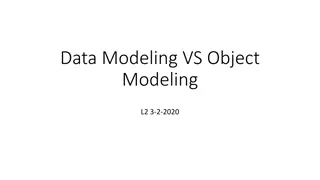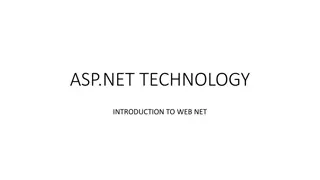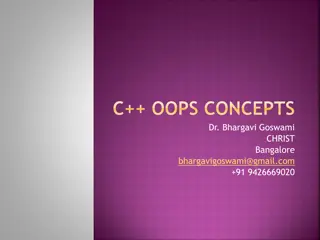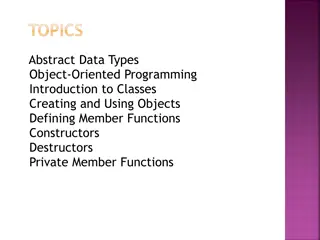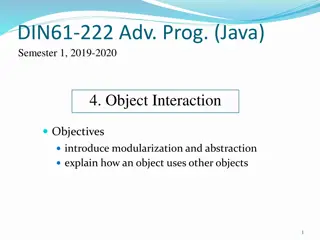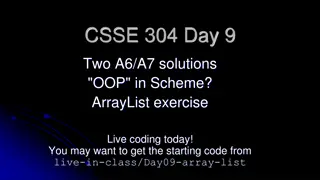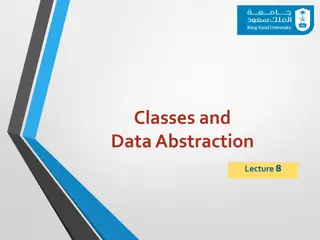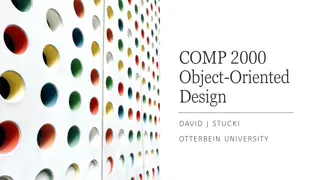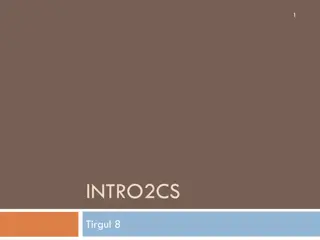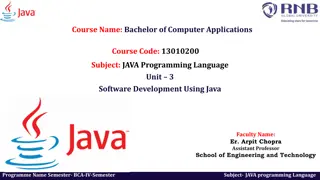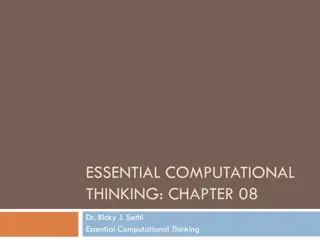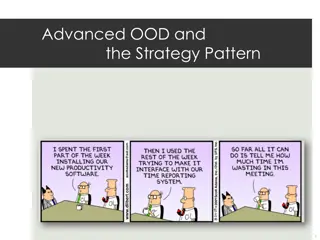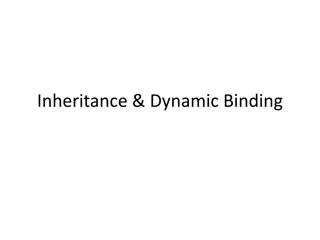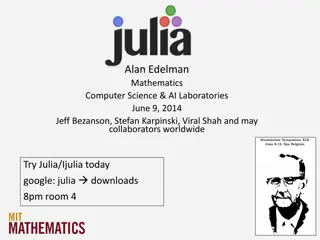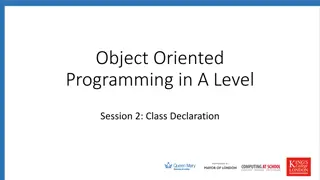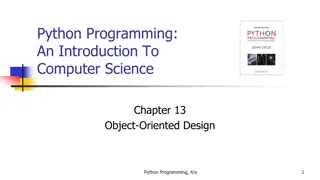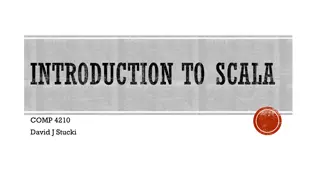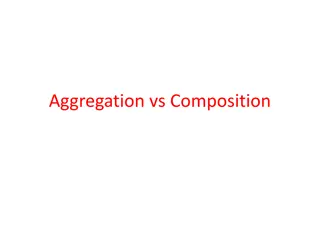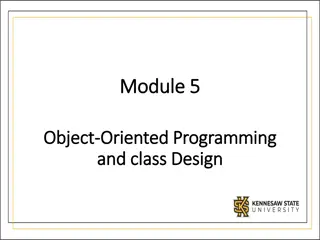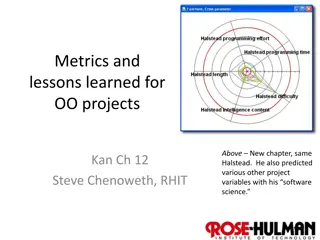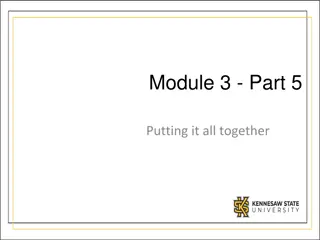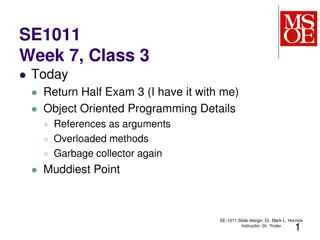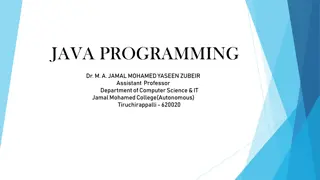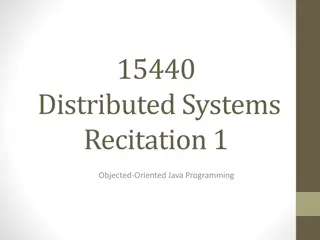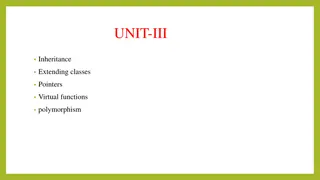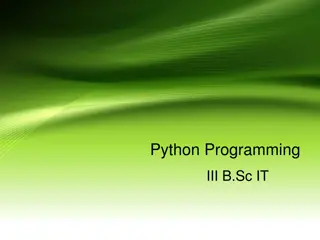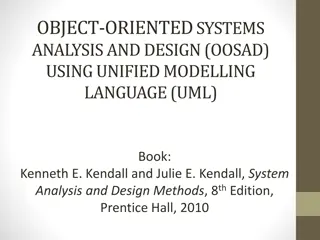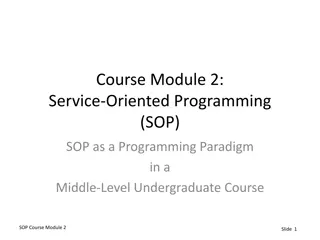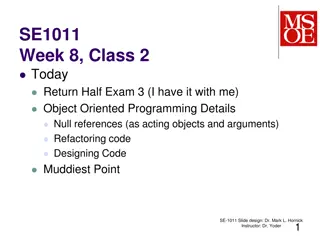Understanding Abstract Classes and Inheritance in Object-Oriented Programming
Inheritance in object-oriented programming allows for reusing proven and debugged high-quality software through abstract classes. Abstract classes serve as superclasses and cannot be instantiated, instead, they force child classes to implement specific methods. Concrete and abstract methods can coex
6 views • 15 slides
Understanding Inheritance and Polymorphism in Object-Oriented Programming
Inheritance in object-oriented programming allows the creation of new classes derived from existing classes, promoting code reuse. By extending a general superclass to specialized subclasses, developers can model different entities efficiently. However, it's crucial to understand when to use inherit
1 views • 61 slides
Object-Oriented Programming in C++ with Dr. Ian Reid - Course Overview
Dive into the world of object-oriented programming with Dr. Ian Reid's course on C++. Learn about classes, methods, inheritance, polymorphism, and design patterns. Understand the principles of OOP and how to implement them using C++. Enhance your skills in data hiding, encapsulation, and templates.
3 views • 78 slides
Understanding Object Oriented Programming (OOP) Principles
Object-Oriented Programming (OOP) is a software design approach where programmers define data structures and operations. Key principles include objects, classes, data encapsulation, inheritance, polymorphism, and data abstraction. OOP allows for better organization and reusability of code, fostering
0 views • 15 slides
Understanding Object-Oriented Programming Concepts
Object-oriented programming enables the effective development of large-scale software and GUIs by defining classes to represent entities in the real world as objects with unique identities, states, and behaviors. Objects have data fields representing their properties and methods defining their actio
2 views • 70 slides
Understanding Data Modeling vs Object Modeling
Data modeling involves exploring data-oriented structures, identifying entity types, and assigning attributes similar to class modeling in object-oriented development. Object models should not be solely based on existing data schemas due to impedance mismatches between object and relational paradigm
0 views • 17 slides
Understanding VB.NET: Features, Advantages, and Disadvantages
VB.NET is a popular object-oriented programming language developed by Microsoft as a successor to Visual Basic 6. It offers features like object-oriented programming, automatic code formatting, multithreading, and event management. Despite its advantages in code formatting and ease of web applicatio
2 views • 8 slides
Understanding Object-Oriented Programming (OOP) in Python
Python is a versatile programming language that supports various programming approaches. Object-Oriented Programming (OOP) is a popular method in Python where objects are created to solve programming problems. OOP in Python focuses on creating reusable code, following the principle of DRY (Don't Rep
1 views • 35 slides
Understanding Object-Oriented Programming Concepts in C++
Exploring C++ Object-Oriented Programming concepts with Dr. Bhargavi Goswami from CHRIST Bangalore. Dive into software crisis management, syllabus recommendations, topic lists, and issues to address in system design and software development. Uncover facts, reports, and a discussion on the delivery c
0 views • 38 slides
Understanding Object-Oriented Programming Concepts
Object-oriented programming (OOP) is a powerful paradigm that helps in organizing and designing programs effectively. This summary covers key aspects such as designing a program, top-down structured design, the importance of OOD, defining objects, identity, state, behavior in OOP, and examples of st
2 views • 18 slides
Introduction to Object-Oriented Programming and Data Abstraction
Introduction to object-oriented programming concepts including classes, objects, member functions, constructors, destructors, and abstract data types. Exploring the principles of abstraction in software development, passing objects to functions, and understanding the limitations of procedural progra
0 views • 47 slides
Understanding Modularization and Abstraction in Object-Oriented Programming
Modularization in programming involves breaking down complex problems into simpler sub-parts, while abstraction allows combining low-level details into higher levels. By using modules and abstract classes, software development becomes more manageable and efficient, especially in object-oriented prog
0 views • 39 slides
Object-Oriented Programming Concepts Illustrated
Learn about creating and working with arrays, defining functions, and building classes in an object-oriented programming context. Dive into examples like creating arrays of objects, defining arrays with pointers, and designing classes for a publishing company that markets books and audio cassettes.
5 views • 24 slides
Exploring Object-Oriented Programming in Scheme
The content discusses implementing object-oriented programming concepts in Scheme, focusing on encapsulation through fields and methods. It explores representing objects and manipulating fields exclusively through methods. The tutorial covers creating objects, defining methods, and accessing fields
2 views • 13 slides
Understanding Classes and Data Abstraction in Object-Oriented Programming
Object-oriented programming (OOP) encapsulates data and functions into classes, akin to blueprints for creating objects. This lecture delves into the relationship between classes, objects, data members, member functions, and user-defined types. It emphasizes the reuse and encapsulation of code, info
5 views • 22 slides
Understanding Object-Oriented Design Principles
Explore the core concepts of object-oriented design, including objects, classes, and the object-oriented paradigm. Learn about the relationship between objects and classes, and how they form the building blocks of software development. Gain insights into class components, attributes, and methods, an
0 views • 18 slides
Introduction to Object-Oriented Programming in CS with RPG Example
Today's session focuses on introducing Object-Oriented Programming (OOP) and its concepts through a Role-Playing Game (RPG) example. The content covers the transition from Procedural Programming to OOP, encapsulating data in objects, and practical implementation with a hero, goblin, and multiple mon
0 views • 46 slides
Understanding Java Programming: BCA IV Semester Course Overview
This Bachelor of Computer Applications (BCA) course focuses on Java programming language fundamentals, object-oriented concepts, software development principles, and practical application skills. Students will learn to define Java program features, implement object-oriented features, work with array
0 views • 31 slides
Understanding Object-Oriented Programming (OOP) in Python
Object-Oriented Programming (OOP) is a programming paradigm that focuses on organizing code into objects with attributes and behaviors. Python supports various OOP concepts such as classes, objects, inheritance, polymorphism, abstraction, and encapsulation. Classes serve as blueprints for creating o
0 views • 29 slides
Understanding Object-Oriented Programming (OOP) Concepts in Chapter 8
Delve into the world of Object-Oriented Programming (OOP) through Chapter 8 of 'Essential Computational Thinking' by Dr. Ricky J. Sethi. Explore how classes and objects form the backbone of OOP, how messages are sent between objects, and the difference between regular and object reference variables.
0 views • 29 slides
Understanding Advanced Object-Oriented Design and the Strategy Pattern
Delve into the intricate world of Object-Oriented Design (OOD) with a focus on the Strategy Pattern. Explore the fundamental principles of OOD, such as encapsulation, abstraction, and the Single Responsibility Principle. Discover how objects interact through messages and how to ensure each class has
0 views • 22 slides
Understanding Inheritance and Dynamic Binding in Object-Oriented Programming
Explore the concepts of inheritance and dynamic binding in Object-Oriented Programming. Learn how subclasses inherit attributes and methods from parent classes and how dynamic binding allows for method overriding. Discover how to implement these concepts in classes like USBFlashDrive, Computer, and
0 views • 15 slides
Exploring Object-Oriented Programming and Abstractions in Technical Computing
Delve into the realms of object-oriented programming, multi-methods, and abstractions in technical computing through various images and descriptions presented in the content. Discover the intersection of mathematics, computer science, and AI labs with a focus on Julia programming language and its ap
0 views • 10 slides
Object-Oriented Programming Basics for A-Level Students
Explore the fundamentals of object-oriented programming through class declaration, use of objects and methods, decomposition, abstraction, and more. Dive into topics like declaring classes, inheritance, polymorphism, and class diagrams. Gain insights into Python programming, modules, constructors, f
0 views • 35 slides
Understanding Object-Oriented Design in Python Programming
Object-Oriented Design (OOD) is a fundamental concept in modern computer applications. It involves structuring systems as black boxes with interfaces, allowing for the encapsulation, polymorphism, and inheritance. OOD separates the implementation details from the user, enabling the design of complex
0 views • 189 slides
Understanding Scala: A Multi-Paradigmatic Language
Scala is a powerful language designed by Martin Odersky that seamlessly blends object-oriented and functional programming paradigms. With origins in the 1930s and a release in 2004, Scala runs on the JVM, offering features like type inference, first-class functions, and full object orientation. Its
0 views • 9 slides
Understanding Multiple Inheritance in Object-Oriented Programming
Multiple inheritance in object-oriented programming allows a derived class to inherit from more than one base class, creating a unified derived class. This design structure is suitable when the base classes are orthogonal and have no common attributes or behaviors. The derived class logically combin
0 views • 14 slides
Understanding the Difference Between Aggregation and Composition in Object-Oriented Programming
Aggregation and Composition are two important concepts in object-oriented programming. Aggregation refers to a 'has-a' relationship where the contained object can survive independently, while Composition indicates that the member object is part of the containing class and cannot exist separately. Th
0 views • 15 slides
Understanding Object-Oriented Programming and Class Design
Object-Oriented Programming (OOP) is centered around classes that serve as blueprints for creating objects. Classes define the structure and behavior of objects, providing a framework for modeling real-world entities. By creating classes and objects, developers can efficiently represent and manipula
0 views • 50 slides
Metrics and Lessons Learned for Object-Oriented Projects
This chapter discusses various metrics and lessons learned for object-oriented projects, including the use of major OO metrics, Lorenz's metrics, IBM's Object Oriented Technology Council recommendations, and the CK metrics suite. The CK metrics suite covers six OO design and complexity measures, suc
0 views • 17 slides
Exploring Computer Programming Principles
Dive into the world of computer programming, covering high-level and machine languages, compilers, interpreters, writing programs, top-down design, and the array of programming languages available. Understand the essentials of building code to control computers, the diversity of programming language
0 views • 23 slides
Understanding Object-Oriented Programming Concepts and Polymorphism Using Java and C#
Explore key Object-Oriented Programming concepts like inheritance, method overriding, abstract classes, interfaces, and polymorphism through examples in Java and C#. Delve into class structures, casting, and handling different object types at runtime. Learn how to effectively utilize these principle
0 views • 12 slides
Object-Oriented Programming Details: References, Overloaded Methods, and Garbage Collector
Today in class, we covered returning half of Exam 3, focusing on object-oriented programming intricacies such as passing references as arguments, overloaded methods, and the role of the garbage collector. Modifications to lab requirements were discussed to ensure comprehensive use of implemented met
0 views • 15 slides
Fundamentals of Object-Oriented Programming in Java
Object-Oriented Programming (OOP) is a methodology that simplifies software development by using classes and objects. This paradigm includes concepts like Object, Class, Inheritance, Polymorphism, Abstraction, and Encapsulation. Other terms used in OOP design include Coupling, Cohesion, Association,
0 views • 54 slides
Understanding Object-Oriented Java Programming Concepts
Explore the fundamentals of object-oriented programming in Java, covering topics such as user-defined classes, inheritance, polymorphism, abstract classes, and interfaces. Learn about packages, encapsulation, access modifiers, overloading methods, and more to enhance your Java programming skills.
0 views • 17 slides
Understanding Inheritance in Object-Oriented Programming
Inheritance allows a class to inherit properties and characteristics from another class, promoting code reusability and reducing duplication. It is a fundamental feature in Object-Oriented Programming that enhances modularity and scalability by structuring classes hierarchically. Different modes and
0 views • 50 slides
Introduction to Python Programming for B.Sc. IT Students
Python is a dynamic, high-level, and versatile programming language suitable for B.Sc. IT students. It supports object-oriented programming and offers a wide range of high-level data structures. Python's simplicity, ease of learning, and extensive library make it a popular choice for application dev
0 views • 13 slides
Object-Oriented Systems Analysis and Design (OOSAD) Using Unified Modeling Language (UML)
Explore the fundamentals of object-oriented analysis and design using UML, a powerful tool for constructing and visualizing systems. Learn about object-oriented concepts, classes, inheritance, UML diagrams, use case modeling, activity and sequence diagrams, and more. Discover how UML can enhance the
0 views • 144 slides
Understanding Service-Oriented Programming in Middle-Level Courses
Service-Oriented Programming (SOP) is a new programming paradigm focusing on using services to design and develop integrated business applications. This module covers the importance of SOP in current application development, fundamental concepts of web services, standards underlying service-oriented
0 views • 22 slides
Object-Oriented Programming: Class 2 Recap and Muddiest Points Discussion
Today's class delved into object-oriented programming, null references, refactoring code, and designing code. We reviewed static classes and discussed the ins and outs of using "this" and "other" in programming. The muddiest points included understanding the behavior of null objects, short-circuit o
0 views • 9 slides
